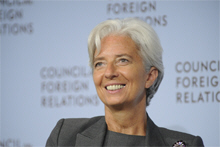
Typical street scene in Santa Ana, El Salvador. (Photo: iStock)
IMF Survey: Three Ways to Unlock Strong, Stable, Balanced Growth
July 26, 2011
- Global recovery set to post reasonable near-term growth but remains unbalanced
- Essential that eurozone, U.S. debt problems be addressed quickly
- Middle East events show effects of socially imbalanced growth on politics
Three major challenges—sovereign debt, growth, and social instability—currently confront the world economy, IMF Managing Director Christine Lagarde told a New York City audience.

Lagarde: ‘We need the right kind of growth, that creates jobs and lifts people across the socioeconomic spectrum’ (photo: Don Pollard/CFR)
IMF AND THE WORLD ECONOMY
These challenges are intimately intertwined, and only by solving all three can the world unlock strong, stable, and balanced global growth, she said.
In a July 26 speech at the Council on Foreign Relations, Lagarde stressed that for sovereign debt to be sustainable, economic growth needs to be strong, but in a sustainable way. “And for economic growth to be sustainable, it needs to deliver the stable social chemistry that holds societies together.”
On sovereign debt, Lagarde said fiscal problems in the periphery of Europe had revealed the risks posed by an incomplete economic and monetary union. She noted that eurozone leaders had reached an important agreement, including a commitment to finance program countries until they can regain market access, as long as those programs are implemented effectively. This means that for Greece and other program countries the main priority is “implementation, implementation, implementation.”
“The agreement shows that European leaders believe in the eurozone, and will do what it takes to secure its destiny,” Lagarde said. “It has been welcomed by financial markets, as reflected in the stronger euro and lower peripheral bond spreads. But turbulence could easily resurface. For this reason, it is essential that the summit’s commitments should be implemented quickly.”
Lagarde said she hoped for bold fiscal action in the United States. "On the debt ceiling, the clock is ticking, and clearly the issue needs to be resolved immediately. Indeed, an adverse fiscal shock in the United States could have serious spillovers on the rest of the world. But more fundamentally, a credible fiscal adjustment plan is needed sooner rather than later." The less urgent situation in Japan also needed ambitious measures to deal with the very high level of public debt, she said.
Unbalanced recovery
On growth, Lagarde said the global recovery is set to post reasonable near-term growth but remains unbalanced, with signs of overheating in emerging economies, surging commodity prices hitting low-income countries, and deep and long-lasting crisis effects in advanced economies.
“Boosting growth in these economies is no small task. And the goal can’t simply be any growth—we need the right kind of growth, that creates jobs and lifts people across the socioeconomic spectrum,” Lagarde said.
On social instability, Lagarde said events in the Middle East and North Africa had shown how socially imbalanced growth contributed to the political upheaval. In many emerging and developing economies, rising commodity prices were exacerbating social problems associated with high joblessness.
“Social problems are of major concern to advanced economies too,” Lagarde stated. “The young in particular are having a hard time finding work—with potentially lifelong implications in terms of employability and income. At the same time, the older generations are fighting to protect their health and pension benefits.”
These trends raised the prospect of intergenerational conflict, Lagarde observed. “This is why focusing on the right kind of growth is so important.”
An even more effective IMF
The IMF had been an intellectual leader during the global economic crisis, with its early call for coordinated policy stimulus, Lagarde stated. “It has been a flexible financial partner, reforming its lending instruments and making available a record amount of support, totaling about $330 billion. And it is helping build a stronger global economy, through its policy advice and technical assistance efforts.”
But the IMF had to adapt to the changing needs of its members, Lagarde stated. She set out four organizing principles for an IMF that is even more effective, noting that they each begin with the letter C.
• The IMF must be client focused, preserving the stability of arguably its most important client, the international monetary system. But member countries are also the IMF’s clients. “And so by focusing on the policies needed to stabilize the system as a whole, the IMF can help its members find the policies best suited to deliver strong and stable growth over the long run,” Lagarde said.
• The IMF must understand better the connections both between and within countries. IMF staff are just completing a study of how policies in the world’s five most systemically important economies—China, the euro area, Japan, the United Kingdom, and the United States, affect stability in others. Within countries, the IMF must better understand connections such as macrofinancial linkages.
• The IMF must be comprehensive. “When evaluating the strength of an economy, we need to look beyond the standard economic and financial criteria to make sure that we don’t miss other factors—such as social concerns, or political economy issues—that may threaten macroeconomic stability,” Lagarde said.
• The IMF must be credible in how it works and how it is governed. “All countries should get fair treatment from the IMF—fair in listening to their views, fair in evaluating their policies, and fair in reporting them to the world,” Lagarde said. Credibility of the IMF’s governance is also essential for the institution to be effective. “For too long, the IMF’s voting structure reflected the economic realities of bygone days. But this is changing.” Last year, Lagarde noted, IMF members agreed to boost the voting power of the world’s fastest-growing economies.







